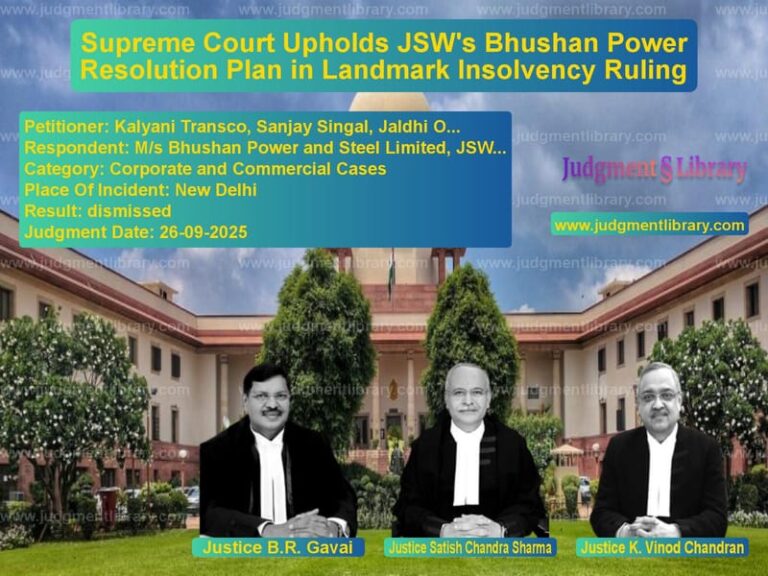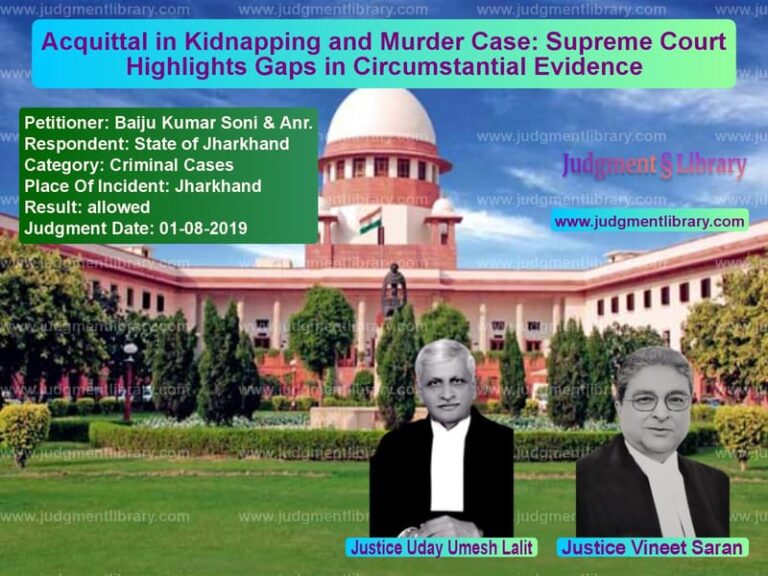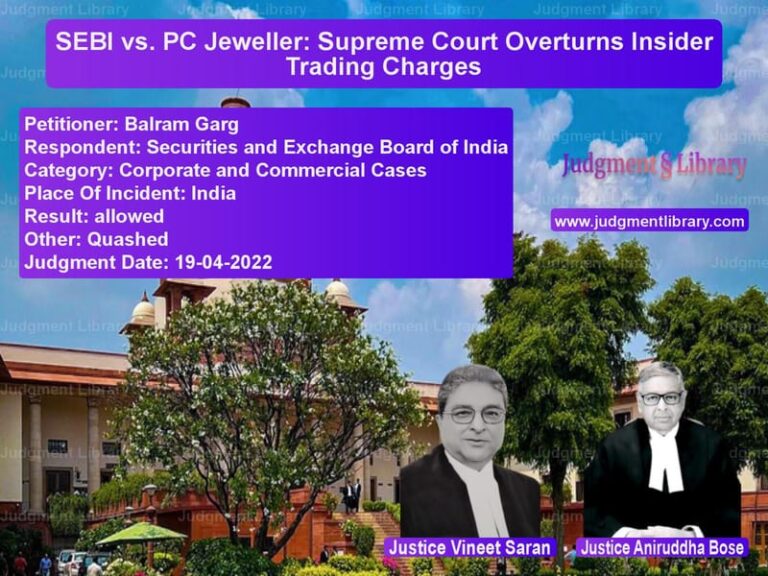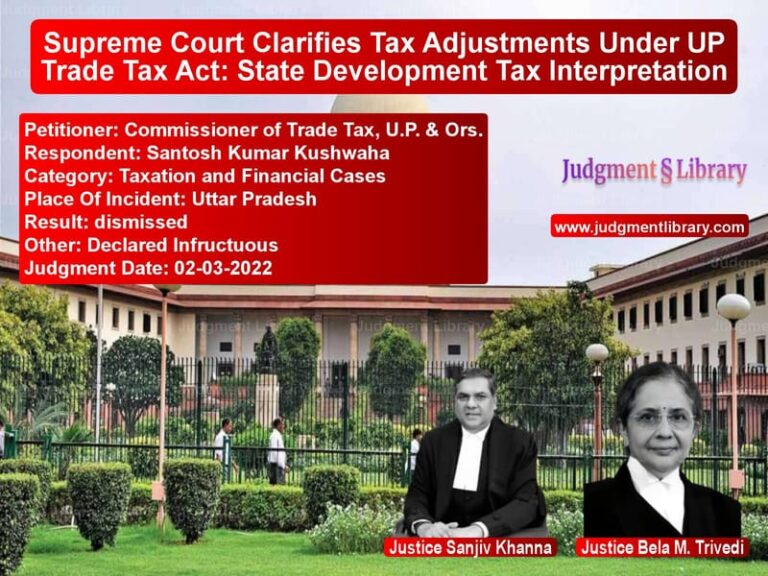Murder Conviction Upheld: Supreme Court Rejects Appeal in Chhattisgarh Stabbing Case
The Supreme Court of India recently delivered a crucial judgment in the case of Suresh Yadav @ Guddu vs. The State of Chhattisgarh. The case involved the brutal murder of a young woman in a fit of rage, leading to the conviction of the accused under Section 302 of the Indian Penal Code (IPC) and Sections 25 and 27 of the Arms Act. The Supreme Court upheld the lower court rulings and dismissed the appeal, emphasizing that concurrent findings of fact by the Trial Court and High Court cannot be easily disturbed unless there is a manifest illegality.
Background of the Case
The appellant, Suresh Yadav, was accused of murdering the deceased, with whom he was allegedly in a romantic relationship. According to the prosecution, the accused became enraged upon seeing the deceased talking to another man. Acting in a fit of jealousy, he attacked the deceased with a pointed knife, inflicting 12 stab wounds that led to her death. The post-mortem report confirmed that the deceased had suffered multiple penetrating wounds, including injuries to her lungs and liver.
The police arrested the accused, and the trial commenced before the Ninth Additional Sessions Judge (Fast Track Court), Durg. The court found him guilty and sentenced him to life imprisonment. The accused challenged this conviction before the Chhattisgarh High Court, which upheld the Trial Court’s findings. Dissatisfied, the accused approached the Supreme Court.
Petitioner’s Arguments
- The petitioner’s counsel argued that there was no forensic evidence linking the knife allegedly used in the murder to the deceased.
- He claimed that the sole eyewitness (PW-1) was unreliable because, despite witnessing the incident, he neither raised an alarm nor attempted to intervene.
- It was contended that the excessive number of injuries suggested the involvement of multiple assailants, raising doubts about the prosecution’s case.
- The defense further argued that the conviction was based on circumstantial evidence and should not have been upheld without stronger proof.
Respondent’s Arguments
- The prosecution countered that the eyewitness testimony was clear and credible.
- It pointed out that the knife used in the murder was recovered on the basis of the accused’s disclosure, strengthening the case against him.
- The prosecution argued that the number and nature of injuries indicated repeated stabbing by a single individual in a fit of rage.
- The State submitted that the High Court had thoroughly examined the evidence and found no grounds for interference.
Supreme Court’s Judgment
The Supreme Court dismissed the appeal, reiterating that appellate courts should not interfere with concurrent findings of fact unless there is a clear miscarriage of justice.
Key Observations of the Supreme Court:
- The Court cited its earlier judgment in Pappu v. State of Uttar Pradesh (2022), which emphasized that in appeals against concurrent findings, “each and every finding of fact cannot be contested, nor should such an appeal be treated as another forum for reappreciation of evidence.”
- It held that “there was no error of law or procedure, nor any misreading of evidence that would justify interference with the findings of the lower courts.”
- The Court rejected the argument that multiple injuries suggested the involvement of more than one person, stating that “the nature and similarity of injuries indicate that the deceased was repeatedly stabbed by the same weapon and the same individual.”
- It upheld the credibility of the eyewitness, stating that his failure to raise an alarm did not render his testimony unreliable.
Key Excerpts from the Supreme Court Judgment
The Supreme Court observed:
“The evidence of PW-1, being the eyewitness to the incident, remains unimpeachable and has been believed by the two Courts. His evidence cannot be discarded only for the reason that he allegedly did not raise any alarm or did not try to intervene when the deceased was being ferociously assaulted and stabbed.”
The Court further stated:
“Excessive number of injuries do not ipso facto lead to an inference about involvement of more than one person; rather the nature of injuries and similarity of their size/dimension would only lead to the inference that she was mercilessly and repeatedly stabbed by the same weapon and by the same person.”
Final Verdict
The Supreme Court upheld the conviction and life imprisonment of the accused, ruling that no grounds existed for interference. However, it made a significant observation regarding the remission of the accused’s sentence:
“As per the Office Report and the Custody Certificate placed before us, it appears that on 07.09.2019, the appellant, after having served the sentence of imprisonment for a period of 15 years 9 months and 27 days, was released under Section 432 CrPC by the Government of Chhattisgarh. Having regard to the circumstances, we make it clear that dismissal of this appeal shall not be of any adverse effect on such exercise of power of remission by the Government of Chhattisgarh.”
Conclusion: Implications of the Judgment
This ruling has far-reaching implications:
- It reiterates that concurrent findings of fact by the Trial Court and High Court are binding unless there is manifest illegality.
- It clarifies that excessive injuries do not necessarily indicate multiple assailants.
- It affirms that eyewitness testimony should not be disregarded merely because the witness did not raise an alarm.
- It upholds the principle that special leave petitions cannot serve as another avenue for reappreciation of evidence.
The judgment serves as a significant precedent in criminal law, particularly concerning the standards for appellate intervention in cases involving violent crimes.
Petitioner Name: Suresh Yadav @ Guddu.Respondent Name: The State of Chhattisgarh.Judgment By: Justice Dinesh Maheshwari, Justice Vikram Nath.Place Of Incident: Durg, Chhattisgarh.Judgment Date: 25-02-2022.
Don’t miss out on the full details! Download the complete judgment in PDF format below and gain valuable insights instantly!
Download Judgment: suresh-yadav-@-guddu-vs-the-state-of-chhatti-supreme-court-of-india-judgment-dated-25-02-2022.pdf
Directly Download Judgment: Directly download this Judgment
See all petitions in Murder Cases
See all petitions in Attempt to Murder Cases
See all petitions in Fraud and Forgery
See all petitions in Theft and Robbery Cases
See all petitions in Extortion and Blackmail
See all petitions in Judgment by Dinesh Maheshwari
See all petitions in Judgment by Vikram Nath
See all petitions in dismissed
See all petitions in supreme court of India judgments February 2022
See all petitions in 2022 judgments
See all posts in Criminal Cases Category
See all allowed petitions in Criminal Cases Category
See all Dismissed petitions in Criminal Cases Category
See all partially allowed petitions in Criminal Cases Category







